Phenomenal Females
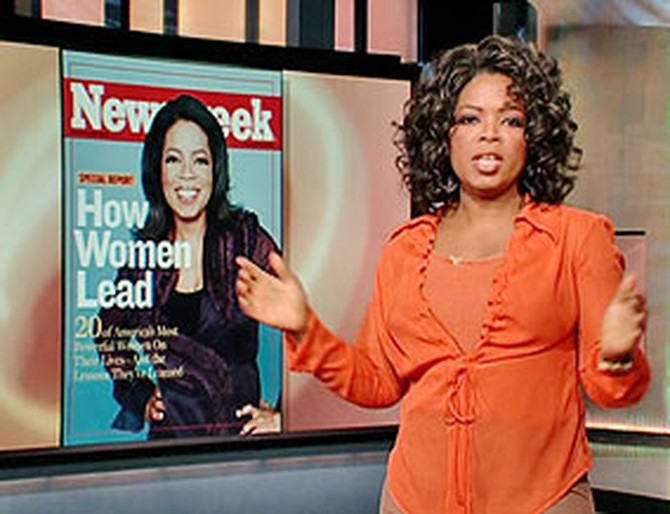
leaders.newsweek.com
Oprah graces the cover of O, The Oprah Magazine each month, naturally. But after learning that she'd be the cover girl for Newsweek magazine's issue about 20 of the most powerful women in America*, Oprah was inspired to take action.
She called on some of the smartest, coolest women she knows to handpick phenomenal females that viewers need to get to know. Oprah enlisted the help of Diane Sawyer, Alicia Keys and Gayle King to find women who are changing the world. Oprah also had a few picks of her own.
She called on some of the smartest, coolest women she knows to handpick phenomenal females that viewers need to get to know. Oprah enlisted the help of Diane Sawyer, Alicia Keys and Gayle King to find women who are changing the world. Oprah also had a few picks of her own.
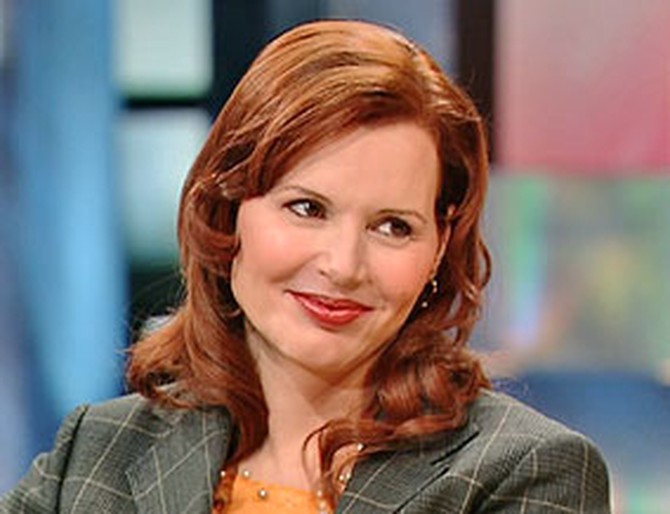
Who's Oprah's first pick? None other than the "first" female president of the United States—and Academy Award®-winning actress—Geena Davis! She may only play the president on TV, but Geena and Oprah agree that the show is history in the making.
Geena's new ABC drama, Commander in Chief, begins with tragedy in the White House. After the president dies of a brain aneurysm, Geena's character, the vice president, takes his place in the Oval Office—despite protest.
When Geena first heard about the role, she jumped at the chance to play President Mackenzie Allen. "It's incredible," Geena says. "Everything that I've cared about sort of just culminates in something like this...to be able to play a part like this when I care so deeply about women's images in the media."
Oprah believes that Geena's groundbreaking role can help pave the way for the first real Madame President. "The fact that you have taken this position as an actress and this show is on TV really does, in the mind-set, clear the way for the possibility of a female president," Oprah says.
Geena's new ABC drama, Commander in Chief, begins with tragedy in the White House. After the president dies of a brain aneurysm, Geena's character, the vice president, takes his place in the Oval Office—despite protest.
When Geena first heard about the role, she jumped at the chance to play President Mackenzie Allen. "It's incredible," Geena says. "Everything that I've cared about sort of just culminates in something like this...to be able to play a part like this when I care so deeply about women's images in the media."
Oprah believes that Geena's groundbreaking role can help pave the way for the first real Madame President. "The fact that you have taken this position as an actress and this show is on TV really does, in the mind-set, clear the way for the possibility of a female president," Oprah says.
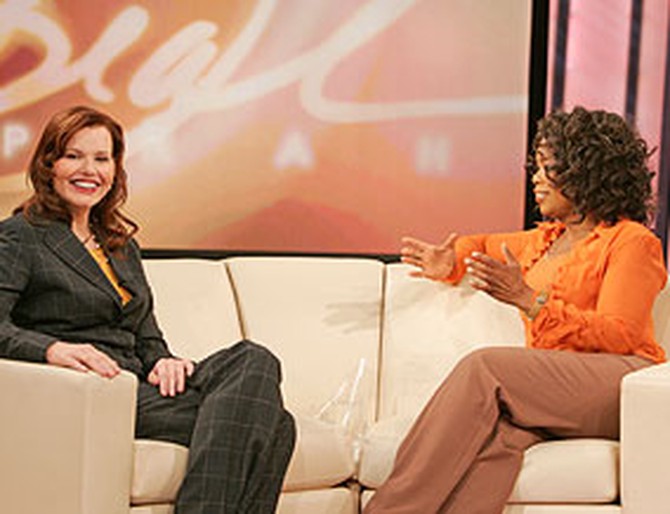
The first time Oprah saw Geena playing the president on television, she got chills. And the first time Geena entered the "Oval Office" as president, she also got chills.
"It's embarrassing to say that I got chills," Geena says. "Not about myself, but about the possibility that someday this will happen. A woman will do this exact thing that I'm doing, and it will be overwhelming. Whenever it happens, it's going to be big."
The United States, Geena tells Oprah, is far behind the rest of the world in regards to women in leadership roles. Currently, America ranks 61st in female representation in government.
"It's embarrassing to say that I got chills," Geena says. "Not about myself, but about the possibility that someday this will happen. A woman will do this exact thing that I'm doing, and it will be overwhelming. Whenever it happens, it's going to be big."
The United States, Geena tells Oprah, is far behind the rest of the world in regards to women in leadership roles. Currently, America ranks 61st in female representation in government.
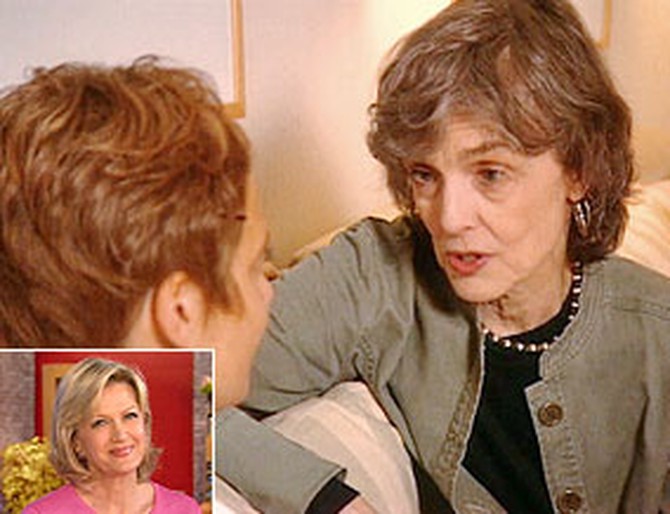
www.friendsindeed.org
When Diane Sawyer received Oprah's assignment, she knew just the woman to choose—Cynthia O'Neal! Cynthia took New York by storm decades ago as a fashion model. Her life was full of adventure, fun and friends. However, in the late '80s, the fun came to a stop. The AIDS crisis began taking the lives of her close friends one by one, and Cynthia knew she had to do something.
That's when Cynthia and Diane's husband, Mike Nichols, opened the doors to Friends In Deed*, an organization that helps support people who have just learned that they have life-threatening illnesses.
"They know the moment they arrive [at Friends In Deed] they will never be in a hospital bed alone," Diane says. "They will never be without someone to lean on or call in the middle of the night. And that's what Cynthia has done, and so many of these people have no other family but Cynthia and Friends In Deed."
Mary Beth, a member of Friends In Deed, joined the organization after finding out that she had a life-threatening brain tumor. Mary Beth is terrified by the possibility of chemo and radiation treatments, but she won't have to go through treatment alone. Cynthia has been by her side since she started coming to Friends In Deed, even accompanying her to doctors' appointments and frequently reminding her that she has the power to choose whether or not to undergo treatment.
"Friends In Deed hasn't ever been about death," Cynthia says. "Friends In Deed has always been about quality of life. How can we make this day the most valuable, rich, wonderful day it can possibly be with whatever it is you have to work with? That's always our focus. I look at it entirely as a blessing, being included in the lives of people who are absolutely magnificent—the courage, the honesty."
That's when Cynthia and Diane's husband, Mike Nichols, opened the doors to Friends In Deed*, an organization that helps support people who have just learned that they have life-threatening illnesses.
"They know the moment they arrive [at Friends In Deed] they will never be in a hospital bed alone," Diane says. "They will never be without someone to lean on or call in the middle of the night. And that's what Cynthia has done, and so many of these people have no other family but Cynthia and Friends In Deed."
Mary Beth, a member of Friends In Deed, joined the organization after finding out that she had a life-threatening brain tumor. Mary Beth is terrified by the possibility of chemo and radiation treatments, but she won't have to go through treatment alone. Cynthia has been by her side since she started coming to Friends In Deed, even accompanying her to doctors' appointments and frequently reminding her that she has the power to choose whether or not to undergo treatment.
"Friends In Deed hasn't ever been about death," Cynthia says. "Friends In Deed has always been about quality of life. How can we make this day the most valuable, rich, wonderful day it can possibly be with whatever it is you have to work with? That's always our focus. I look at it entirely as a blessing, being included in the lives of people who are absolutely magnificent—the courage, the honesty."
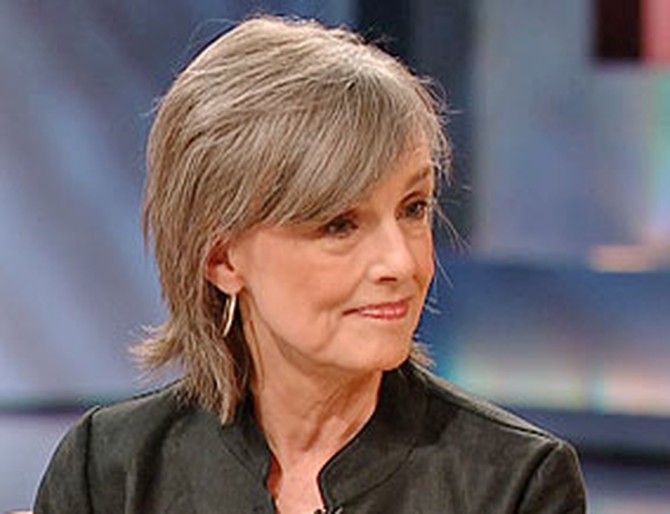
For the past 14 years, Cynthia has helped thousands of terminally ill people deal with the prospect of death. She says that our society is terrified of illness, and oftentimes, patients end up abandoned by their friends and family because no one knows what to say or how to behave around disease.
What advice does Cynthia give to people struggling to find the right words? "You know, we say to people you don't have to say anything," Cynthia says. "You can just go, and be there. It's not about saying anything. It's about going. ... it's about holding a hand."
What advice does Cynthia give to people struggling to find the right words? "You know, we say to people you don't have to say anything," Cynthia says. "You can just go, and be there. It's not about saying anything. It's about going. ... it's about holding a hand."
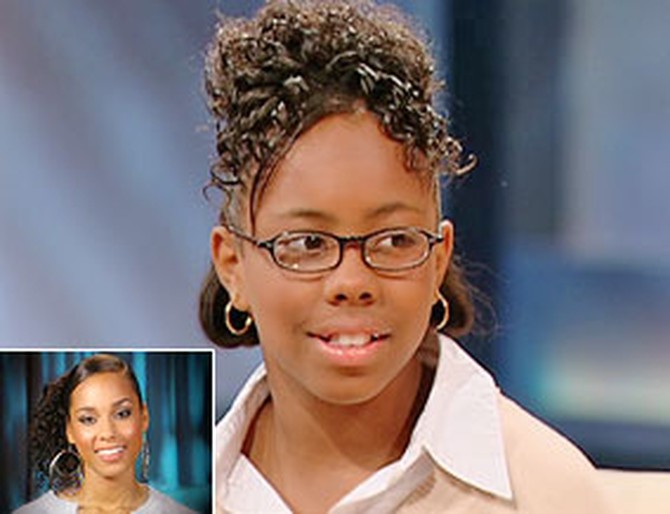
At just 13 years old, Sydnee is already woman enough to be Alicia Keys's inspiration. Sydnee was just your average 10-year-old from Savannah, Georgia, when she was diagnosed with Stage 4 Hodgkin's disease—the most advanced stage of the deadly cancer.
When Alicia met Sydnee backstage after a concert, she was immediately struck by Sydnee's positivity. "From this young girl, I learned about bravery, fortitude and a positive attitude," Alicia says.
Like Alicia, Sydnee uses the power of poetry to express her feelings and guide her along the road to recovery. Throughout eight months of intense chemotherapy, Sydnee chronicled her life in a poem book. Towards the end of her treatment, Sydnee wrote a poem called "If Tomorrow Starts Without Me" that said, "If tomorrow starts without me, I want you all to see that I am still here watching over you as you watched over me."
As a sixth grader, Sydnee wrote her first book, The Small But Big Pain, which begins the first day that she discovered she had Hodgkin's. Nurses have used Sydnee's book as a teaching tool for other children recently diagnosed with cancer.
"I want to tell kids about my story with cancer to let them know they're not the only ones that are going through it," Sydnee says.
Sydnee has been in remission for a year and a half, and she says she would like to be an anesthesiologist when she grows up.
When Alicia met Sydnee backstage after a concert, she was immediately struck by Sydnee's positivity. "From this young girl, I learned about bravery, fortitude and a positive attitude," Alicia says.
Like Alicia, Sydnee uses the power of poetry to express her feelings and guide her along the road to recovery. Throughout eight months of intense chemotherapy, Sydnee chronicled her life in a poem book. Towards the end of her treatment, Sydnee wrote a poem called "If Tomorrow Starts Without Me" that said, "If tomorrow starts without me, I want you all to see that I am still here watching over you as you watched over me."
As a sixth grader, Sydnee wrote her first book, The Small But Big Pain, which begins the first day that she discovered she had Hodgkin's. Nurses have used Sydnee's book as a teaching tool for other children recently diagnosed with cancer.
"I want to tell kids about my story with cancer to let them know they're not the only ones that are going through it," Sydnee says.
Sydnee has been in remission for a year and a half, and she says she would like to be an anesthesiologist when she grows up.
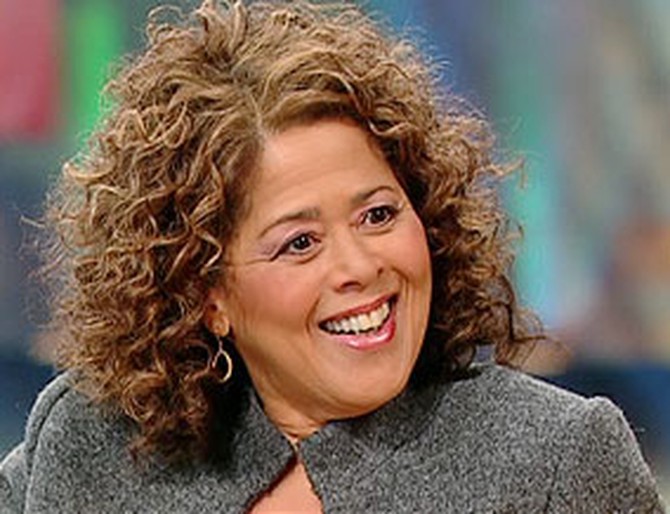
Oprah calls Anna Deavere Smith "the definition of class." You know this smart playwright, university professor and actor from The West Wing and her roles in the films Philadelphia and The American President. Recently, Anna was a guest at Oprah's Legends Ball, honoring extraordinary women. She's now sharing her advice on making a living in the arts in her book Letters to a Young Artist.
Two key qualities of an artist, Anna says, are presence and inquisitiveness. Oprah has presence, Anna says. "It's the feeling that the person on stage is sitting right next to you," Anna explains. Another important trait of an artist, Anna says, is curiosity. "Being an artist of any kind—whether you're just a guardian of the human spirit or whether you're trying to create art that is meaningful in the world—is about being insatiably curious."
Two key qualities of an artist, Anna says, are presence and inquisitiveness. Oprah has presence, Anna says. "It's the feeling that the person on stage is sitting right next to you," Anna explains. Another important trait of an artist, Anna says, is curiosity. "Being an artist of any kind—whether you're just a guardian of the human spirit or whether you're trying to create art that is meaningful in the world—is about being insatiably curious."
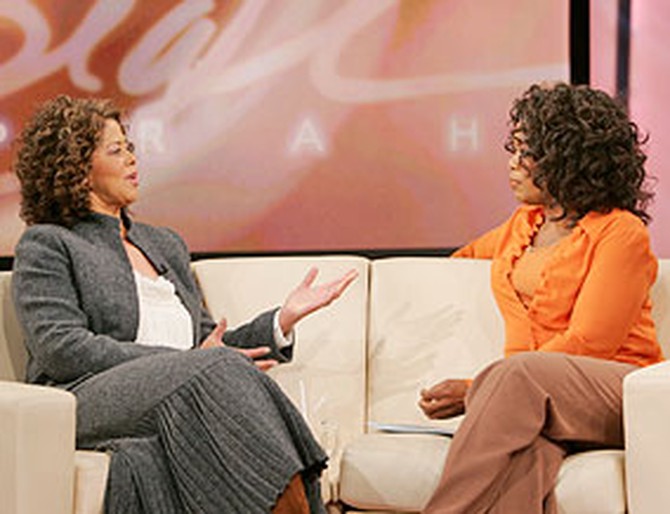
Anna says that women are too careful to avoid conflict. Women in high-powered positions tend to do less arguing than their male counterparts, she says. "I think that we should be bolder—we should argue."
"A great leader," Anna says, "has to have a lot of questions—more questions than answers. I think they have to have intuition because not everything is right out in front of you. ... All of us have inside of us greater knowledge than we know."
Most importantly, Anna says, a leader needs to give people hope. "Hope is not just ... looking out the window and going, 'Everything looks pretty good. 'That's what optimism is. Hope is when you look out the window and you go, 'It doesn't look good at all, but I'm going to go beyond what I see to give people visions of what could be.'"
"A great leader," Anna says, "has to have a lot of questions—more questions than answers. I think they have to have intuition because not everything is right out in front of you. ... All of us have inside of us greater knowledge than we know."
Most importantly, Anna says, a leader needs to give people hope. "Hope is not just ... looking out the window and going, 'Everything looks pretty good. 'That's what optimism is. Hope is when you look out the window and you go, 'It doesn't look good at all, but I'm going to go beyond what I see to give people visions of what could be.'"

At O, The Oprah Magazine, hundreds of stories come across Editor at Large Gayle King's desk every day. Out of all of them, she says we have to meet phenomenal woman Sabriye Tenberken.
Sabriye was born in Germany, and at the age of 12, a degenerative eye disease took away her sight. As a girl she was embarrassed by her blindness. "When I became blind, I didn't want to let other people notice ... that I was different," Sabriye remembers.
Eventually, Sabriye went to a school for the blind and learned self-reliance. She went on to college where she studied the complex language of Tibet. At the time, Tibetan had never been translated into braille—but that didn't stop Sabriye. She created her own Tibetan-German/German-Tibetan braille dictionary, the first of its kind. Her past struggles with blindness sparked an idea that would take Sabriye to the other side of the world. She established the first school for the blind in Tibet in order to give blind children confidence and freedom from shame—a grim challenge in a place with a deep prejudice against the blind. While traveling through Tibet on horseback, Sabriye encountered blind children hidden away in dark rooms and exiled from their own families—one boy had spent his life tied to his bed.
Sabriye was born in Germany, and at the age of 12, a degenerative eye disease took away her sight. As a girl she was embarrassed by her blindness. "When I became blind, I didn't want to let other people notice ... that I was different," Sabriye remembers.
Eventually, Sabriye went to a school for the blind and learned self-reliance. She went on to college where she studied the complex language of Tibet. At the time, Tibetan had never been translated into braille—but that didn't stop Sabriye. She created her own Tibetan-German/German-Tibetan braille dictionary, the first of its kind. Her past struggles with blindness sparked an idea that would take Sabriye to the other side of the world. She established the first school for the blind in Tibet in order to give blind children confidence and freedom from shame—a grim challenge in a place with a deep prejudice against the blind. While traveling through Tibet on horseback, Sabriye encountered blind children hidden away in dark rooms and exiled from their own families—one boy had spent his life tied to his bed.
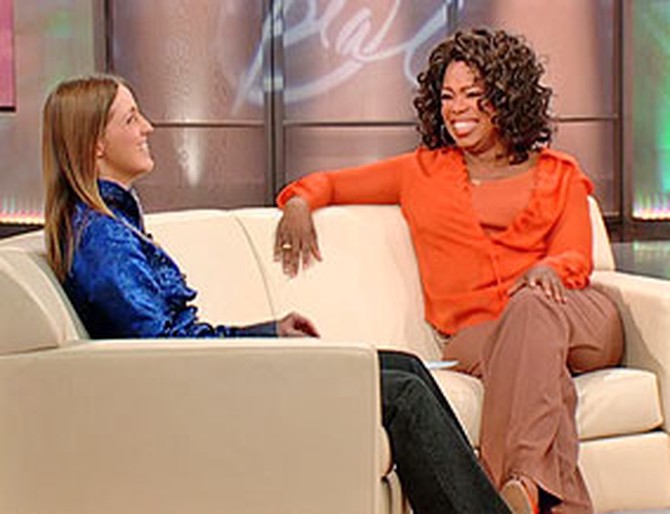
www.braillewithoutborders.org
Sabriye and her boyfriend Paul opened Braille Without Borders* in order to help children around the world "stand up in society and say, 'Hey, I'm blind. So what?'" Thanks to her school in Tibet, blind children who were once outcasts can now read, write, use computers and speak in three languages—giving them the skills to be the main breadwinners in their families! Sabriye chronicles her mission in her new book, My Path Leads to Tibet.
"I think the fact that I go out there and I'm not ashamed of myself," Sabriye says, "and I'm not ashamed to be blind—that made the people think that they also want the same for their own children.
"People very often see only the reasons why things are not possible," Sabriye says. "They never think of the one reason why it is possible. ... A lot of people, they see problems. This is a good thing about being blind: You don't see the obstacles!"
"I think the fact that I go out there and I'm not ashamed of myself," Sabriye says, "and I'm not ashamed to be blind—that made the people think that they also want the same for their own children.
"People very often see only the reasons why things are not possible," Sabriye says. "They never think of the one reason why it is possible. ... A lot of people, they see problems. This is a good thing about being blind: You don't see the obstacles!"
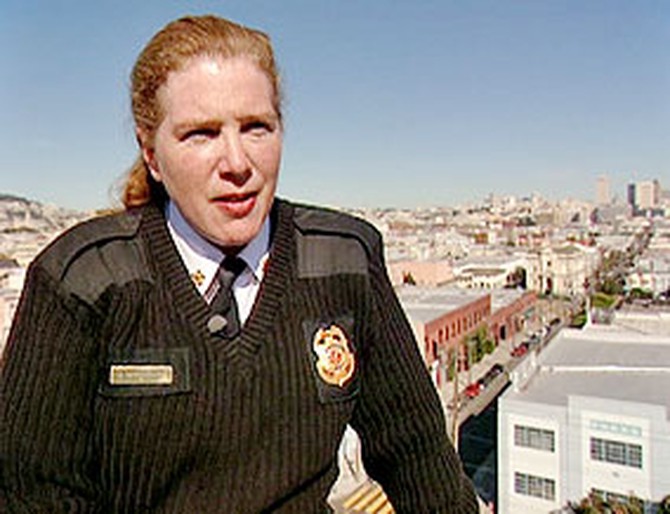
San Francisco made history as the first city in the United States to have women in three top spots at the same time. When Joanne Hayes-White climbed the ladder to fire chief, San Francisco became the largest fire department in the world led by a woman. What makes this even more astounding is the fact that women weren't even allowed to be firefighters in the city until 1987!
Chief Hayes-White knows almost every one of her 1,800 firefighters by name. "I try to lead by example," she says. "I try to be a role model. ... I think it's wonderful when a little girl can see a woman firefighter. It sends a great message that if you work hard, you can achieve your dreams."
Chief Hayes-White knows almost every one of her 1,800 firefighters by name. "I try to lead by example," she says. "I try to be a role model. ... I think it's wonderful when a little girl can see a woman firefighter. It sends a great message that if you work hard, you can achieve your dreams."
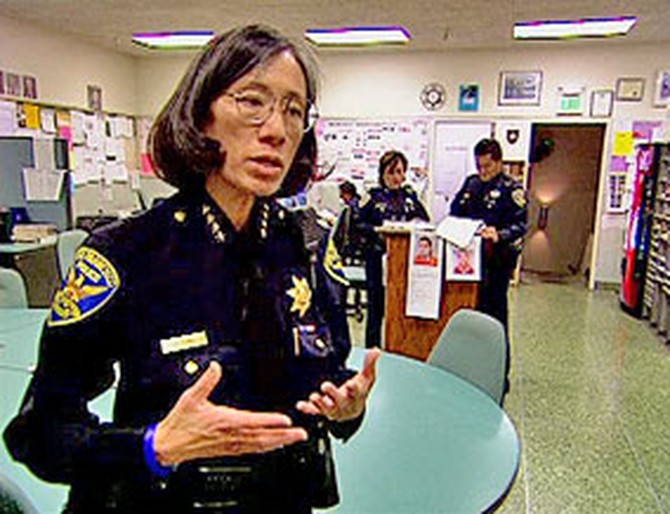
Heather Fong, whose father emigrated from China, is the first woman in San Francisco to break through the ranks and become chief of police. On the force now for 29 years, Chief Fong is known for her long hours and her sense of fairness. Chief Fong also brings a woman's perspective to the scene of a crime.
"When we see people after traumatic situations," Chief Fong says, "I think it's very important that the humanity and the compassion that each of our officers has comes out in those conversations."
"When we see people after traumatic situations," Chief Fong says, "I think it's very important that the humanity and the compassion that each of our officers has comes out in those conversations."
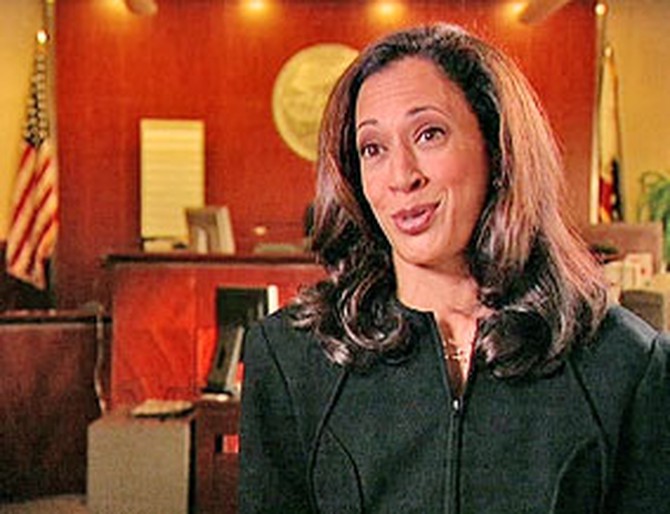
With a 90 percent conviction rate, superstar prosecutor Kamala Harris made history when she was elected California's first African-American female district attorney.
"Law enforcement has such a direct impact on the most vulnerable people in the community," Harris says. "I wanted to be at the table when the decisions were being made."
She believes it is her duty to mentor young women who dream of following in her footsteps. "My mother, who is a very strong influence in my life, always said, 'Kamala, you may be the first to do many things, but make sure you're not the last.'"
"Law enforcement has such a direct impact on the most vulnerable people in the community," Harris says. "I wanted to be at the table when the decisions were being made."
She believes it is her duty to mentor young women who dream of following in her footsteps. "My mother, who is a very strong influence in my life, always said, 'Kamala, you may be the first to do many things, but make sure you're not the last.'"
Published 10/17/2005

